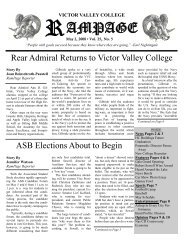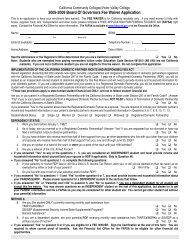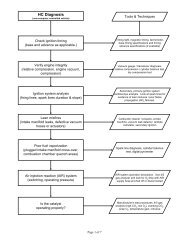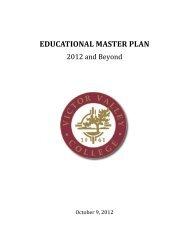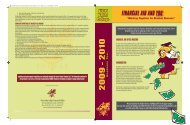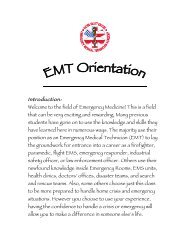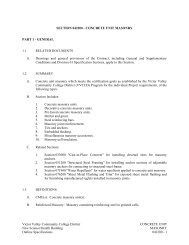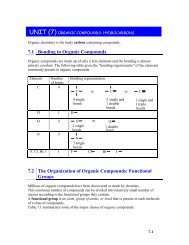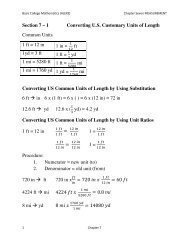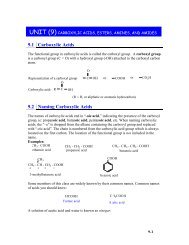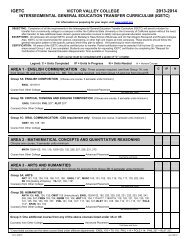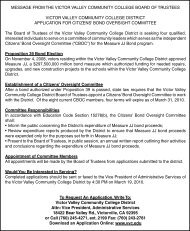Download - Victor Valley College
Download - Victor Valley College
Download - Victor Valley College
You also want an ePaper? Increase the reach of your titles
YUMPU automatically turns print PDFs into web optimized ePapers that Google loves.
MOVING ON<br />
Students who wish to transfer should check with their<br />
intended institution regarding which courses meet that<br />
school’s requirements.<br />
The following discussion corresponds to the “Associate<br />
Degree Graduation Requirements” form that you will<br />
find in this Catalog a few pages from now, which is a<br />
summary of the requirements for the associate’s degree<br />
at VVC. This listing is also available as a worksheet at<br />
the front desk in Counseling (ask for the “green sheet”).<br />
General Requirements (Section A)<br />
This section is a detailed listing of the requirements for<br />
the Associate’s Degree.<br />
Note: If you’re planning to transfer to a university, the<br />
key idea to keep in mind when you plan your courses for<br />
your VVC major and general education requirements is<br />
that you want to fit your transfer university’s course<br />
requirements into VVC’s graduation requirements; that<br />
is, use their required courses to meet VVC’s degree<br />
requirements. (You’ll find more on that in the Transfer<br />
part of this chapter.)<br />
Courses for Your Major (Section B)<br />
Majors are listed in the Instructional Programs section of<br />
this Catalog. At least 18 units are required for a VVC<br />
major; each course in the major must be completed with<br />
a “C” or higher. More information about each area can<br />
be found in the departmental listing in the Programs and<br />
Course Descriptions section of this catalog.<br />
General Education (GE) Requirements<br />
(Section C)<br />
GE Philosophy<br />
The General Education pattern at <strong>Victor</strong> <strong>Valley</strong> <strong>College</strong><br />
is a comprehensive and integrated introduction to<br />
broadly applicable principles, concepts, and methods of<br />
the humanities, natural sciences, communication,<br />
mathematics, and social studies. The awarding of an<br />
Associate Degree by VVC is intended to represent more<br />
than an accumulation of units. It is to symbolize a<br />
successful attempt on the part of the student to<br />
complete a series of learning experiences designed to<br />
increase knowledge, develop competencies, enhance<br />
insights, and encourage lifelong learning.<br />
Student Learning Outcomes<br />
Students who complete the General Education<br />
requirements will attain the knowledge and skills listed<br />
below for each category.<br />
Category I: Natural Sciences<br />
Define and discuss the basic principles, concepts, and<br />
theories of the natural sciences.<br />
Explain and apply the methods scientists use to explore<br />
natural phenomena, including observation, hypothesis,<br />
measurement, experimentation, evaluation of evidence,<br />
and quantitative analysis.<br />
Critically evaluate the limitation, sustainability and social<br />
impact of scientific study.<br />
Category IIa: Social and Behavioral Sciences<br />
Discuss and apply the central theoretical concepts and<br />
methods of contemporary social or behavioral science.<br />
Critically analyze individual or social behavior in a<br />
variety of contexts, including contemporary, historical,<br />
Western, non-Western, and minority.<br />
Identify and apply the principles of effective citizenship,<br />
including civility, respect for diversity, and exercise of<br />
social responsibilities.<br />
Explore, identify, and evaluate the factors that have<br />
shaped our global community to gain an understanding<br />
of the individual's roles in relationship to other<br />
individuals and systems on a global level.<br />
Category IIb: American Institutions<br />
Identify and discuss the basic national, state and/or<br />
local political processes including the US Constitution<br />
and the rights and obligations of citizenship through<br />
responsible engagement in civic duties.<br />
Category III: Humanities<br />
Identify, discuss, and evaluate works of major<br />
philosophical, historical, literary, artistic, and/or cultural<br />
importance.<br />
Critically analyze conceptions of human meaning and<br />
forms of self-expression and self-understanding that<br />
represent the perspectives of different periods of time,<br />
cultures, social and ethnic groups.<br />
Reason effectively about values, including the<br />
application of ethical principles and ethical analysis of<br />
proposed solutions to social problems.<br />
Category IV: Language & Rationality<br />
A. English Composition<br />
Compose a variety of essays and revise these<br />
compositions for clarity, organization, and mechanical<br />
and grammatical correctness.<br />
Summarize, synthesize, and paraphrase various types<br />
of source materials.<br />
Define, access, and evaluate research information from<br />
a variety of sources and using a variety of tools.<br />
Prepare documented research papers using a variety of<br />
resource material and MLA citation/documentation.<br />
REQUIREMENTS FOR CERTIFICATES•DEGREES•TRANSFER<br />
2012-2013 <strong>Victor</strong> <strong>Valley</strong> <strong>College</strong> Catalog 63



